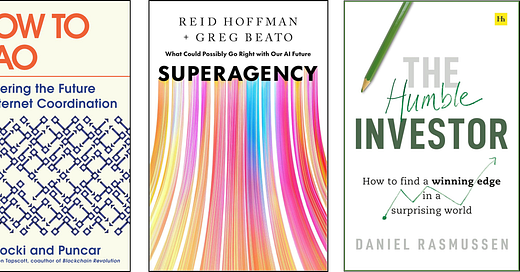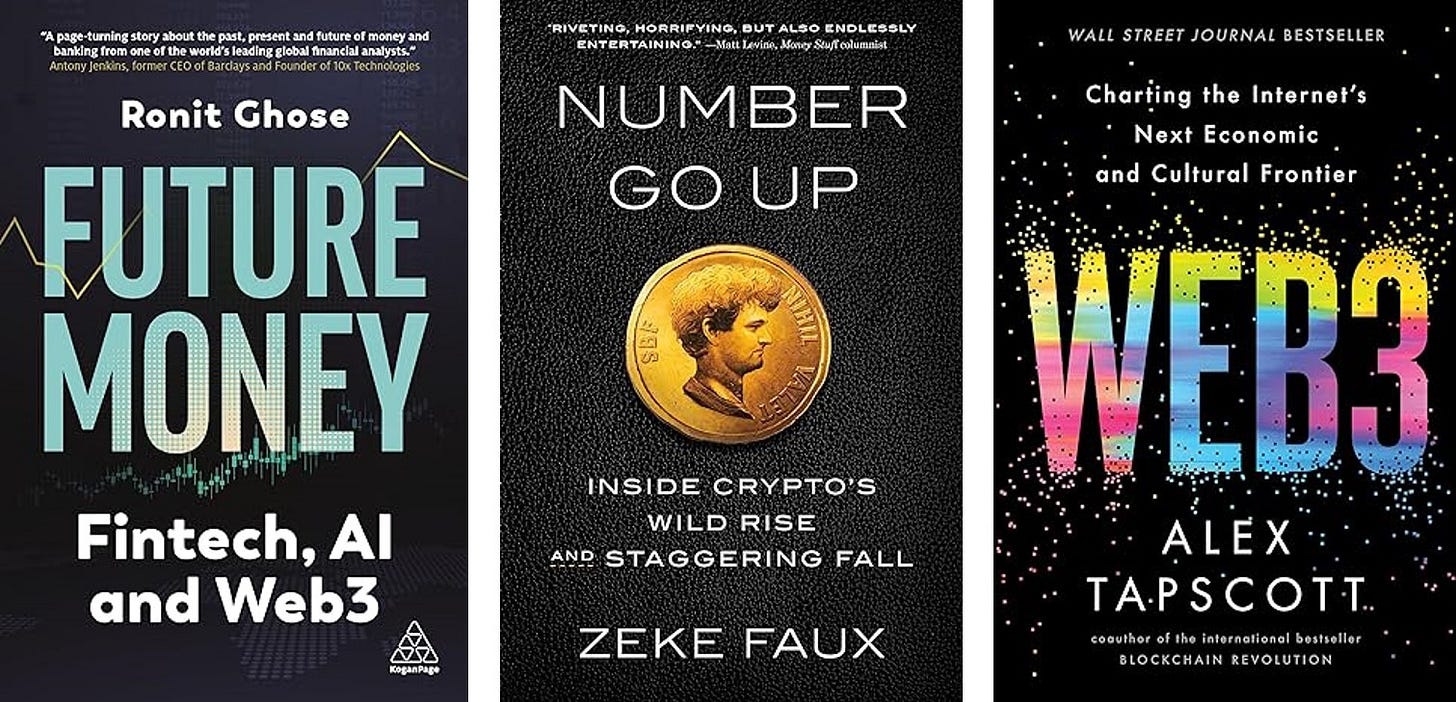The Money Book Circle series – Q1 2025 edition
A quarterly series on the hottest new books on finance and technology
On the go? No problem. We have you covered with the audio version:
Book #1: “Superagency: What Could Possibly Go Right with Our AI Future”
by Reid Hoffman and Greg Beato
Many books on artificial intelligence - in particular the ones selling well - paint it as a threatening technology that will either slash jobs, kill creativity, illegitimately extract value from copyrighted material, cook the planet, or even give rise to a superior intelligence that will annihilate the human race. Not so this book. It makes a powerful argument for the incredible potential of AI to alleviate and even solve many problems humanity faces. It is written by two authors who should know about the technology’s potential: Reid Hoffman, founder of LinkedIn and the author of brilliant books like Blitzscaling, and the prolific and sharp writer Greg Beato. So pay attention.
In this thought-provoking book, the two explore the potential of artificial intelligence to improve our lives and create a more just world. The book challenges conventional fears about AI, arguing that it can be used to increase individual agency and create better outcomes for society as a whole.
The authors discuss the potential of AI to augment human capabilities, such as by providing us with new tools for creativity and problem-solving. It can further be used to reduce inequality and improve access to education and healthcare. And finally, there is ample discussion about the challenges of implementing AI in a responsible and ethical way.
Throughout the book, the authors draw on a wealth of research and examples from the real world to illustrate their points. They also offer a number of practical suggestions for how we can harness the power of AI to create a better future.
Superagency lives strongly from Hoffman’s authority in the field. He throws in all his weight as a star internet entrepreneur, successful author, and venture capitalist. Just recently he co-founded Manas AI, a startup that aims at revolutionizing the drug discovery process with AI. For me personally this is one of the fields I am most enthusiastic to see applied AI work its magic. There are so many use cases that can help humans live longer and healthier lives and they can do so on a big scale. AI can dramatically shorten the process of drug discovery and approval. It can further boost other groundbreaking technologies like CRISPR for gene editing. It is use cases like these that make Superagency so extremely relevant and worthy of reading.
Book #2: “How to DAO: Mastering the Future of Internet Coordination”
by Kevin Owocki and Puncar, Foreword by Don Tapscott
For me Decentralized Autonomous Organizations have always been one of the most fascinating crypto ideas. Not only that they combine multiple advanced blockchain concepts such as smart contracts or different kind of tokens. But because of their promise of sheer endless automation. Its proponents argue that you can build most companies completely on algorithms. An insurance company without risk analysts. A bank without product managers. A currency without a central bank.
"How to DAO: Mastering the Future of Internet Coordination" offers a comprehensive and insightful guide to the world of Decentralized Autonomous Organizations (DAOs). Co-authored by Kevin Owocki, a prominent figure in the DAO space, and Puncar, the book delivers a practical and theoretical exploration of this burgeoning field. It's not just a technical manual, but a roadmap for navigating the complexities and potential of decentralized governance. Readers learn all sorts of “how tos”, for example how to invest in a DAO or how to start one. Especially relevant: How to protect yourself legally when entering the world of DAOs. After all, the legal clarity is currently a much larger problem than the technical capabilities.
What I also enjoyed thoroughly was the foreword by Don Tapscott, a legend of the blockchain world. He basically argues that DAOs could transform the nature of the corporations like nothing else in history. They hold the keys to radically transforming the essential building block of capitalism.
One of the book's greatest strengths is its accessibility. While it delves into the intricacies of DAO mechanics, smart contracts, and governance processes, it does so in a way that's understandable even for those new to the concept. The authors effectively break down complex ideas into digestible chunks, using clear language and real-world examples to illustrate their points. They avoid overly technical jargon, making the book approachable for a wider audience, including entrepreneurs, developers, and anyone curious about the future of online communities.
Beyond the technical aspects, "How to DAO" explores the philosophical and societal implications of DAOs. It examines the potential for these organizations to revolutionize how we collaborate, make decisions, and organize ourselves, offering a compelling vision of a more decentralized and democratic future. The book also addresses the challenges and potential pitfalls of DAOs, acknowledging the complexities of governance, security risks, and the evolving regulatory landscape. This balanced approach adds credibility and provides a realistic perspective on the DAO ecosystem.
The book covers a wide range of subjects, including DAO creation, tokenomics, community building, legal considerations, and the various tools and platforms available. The inclusion of case studies and practical examples further enhances the learning experience, allowing readers to see how DAOs are being used in different contexts.
Overall, "How to DAO: Mastering the Future of Internet Coordination" is for anyone interested in understanding the potential of DAOs. It's a valuable resource for both newcomers and experienced practitioners, providing a comprehensive and insightful overview of this transformative technology. While the DAO landscape continues to evolve, this book provides a solid framework for navigating its complexities and unlocking its potential.
Book#3 “The Humble Investor: How to find a winning edge in a surprising world”
by Daniel Rasmussen
"The Humble Investor: How to find a winning edge in a surprising world" by Daniel Rasmussen offers a refreshing and much-needed perspective on investing. In a world often dominated by complex jargon and promises of quick riches, this book champions a more grounded, evidence-based approach that emphasizes humility and long-term thinking. It's not about getting rich quick, but about building wealth steadily and sustainably. Why is this book so relevant for people enthusiastic about tech, i.e. for readers of this newsletter? When you are a crypto investor or a VC or an investor in shooting stars like NVIDIA or Tesla you are used to returns of hundreds of percent per year (and sometimes losses). Occasionally even more. You turn into anything but a humble investor. Recently many messages reached me from readers mourning their investments into Ethereum, because it earned them a “meager” 50% in 2024. Investors used to stellar tech performances will perhaps benefit most from reading this book. We must always remember that technology is markedly different to any other industry.
Rasmussen looks at different types of investment rationales and attempts to evaluate them with empirical evidence. A lack of self-doubt is usually what characterizes the poorer ones. Perhaps this quote from the book best summarizes the general idea: “The best places to make money in markets is where others are too confident in their forecasts.”
One of the book's greatest strengths is its focus on behavioral finance. It acknowledges that investing isn't just about crunching numbers; it's also about managing our own emotions and biases. The author effectively explains how our natural tendencies, such as fear and greed, can lead us astray and sabotage our investment goals. By understanding these psychological pitfalls, readers can learn to make more rational and informed decisions.
The book doesn't shy away from the complexities of the market, but it presents them in a clear and accessible way. It shuns overly technical jargon and instead focuses on explaining fundamental investment principles in a straightforward manner. Rasmussen emphasizes the importance of diversification, asset allocation, and keeping costs low – core concepts that are often overlooked by novice investors. But sometimes also by tech enthusiasts. Though tech investing works by its own rules, those principles apply to it as well.
What sets "The Humble Investor" apart is its emphasis on humility. The author acknowledges the inherent uncertainty of the market and cautions against overconfidence. Instead of trying to predict the future, the book advocates for a more probabilistic approach, focusing on building a portfolio that can withstand a variety of market conditions. This humility is not a sign of weakness, but rather a recognition of the limits of our knowledge and the importance of adapting to change.
While the book doesn't offer any "secret formulas" or "guaranteed winners," it provides readers with a solid foundation for making sound investment decisions. It encourages a disciplined and patient approach, emphasizing the importance of long-term perspective and avoiding impulsive reactions. The book's message is clear: successful investing is not about luck or genius, but about discipline, patience, and a healthy dose of humility.
In a world of ever-increasing financial complexity, "The Humble Investor" is a valuable guide for anyone looking to navigate the markets with confidence and avoid the pitfalls of emotional decision-making.
Limited opportunity: “Fintech and Digital Asset School”
As some of you know, for the last couple of years I have been partnering with Euromoney Learning, and running the highly popular FinTech, Digital Asset & Blockchain School to teach financial services professionals across the world. Usually, these are in-person trainings but now we have a special virtual offer for all those who want to up their game without the hassle of travelling. This May 27-30 we will be running it virtually!
Join this modular, 4-day program to learn about blockchain technology, including its applications, benefits, and challenges in the financial industry and how to leverage it for strategic advantage. You can also book individual modules.
Find out everything you need to know about this career-boosting training opportunity here :
Interested in more books on finance and technology? Check out the top 50 list below.
Note: None of the content of this article and this newsletter, nor my books, presentations, and seminars is legal, tax, investment, financial, or investment advice. Nothing contained constitutes a solicitation, recommendation, endorsement, or offer to buy or sell any securities or other financial instruments. The content is gathered from publicly available information and the expertise of the author. It does not contain any insider information. Also, as an Amazon Associate I occasionally earn from qualifying purchases.






